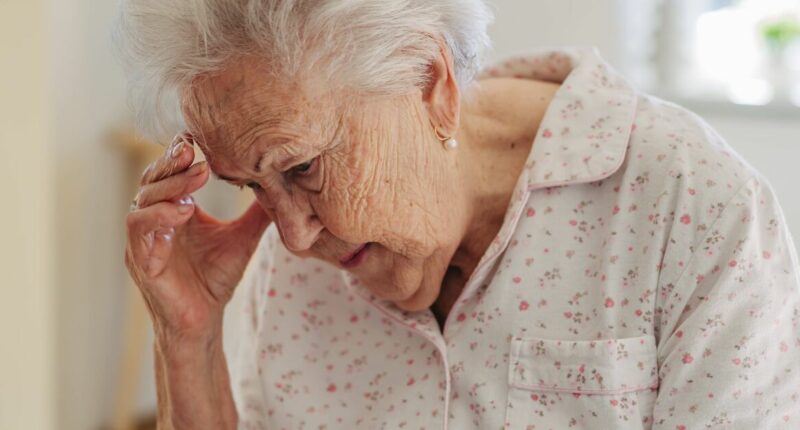Share this @internewscast.com
In the UK, dementia is a growing concern, with over 982,000 individuals currently living with the condition. This number is expected to rise significantly, reaching 1.4 million by 2040. On a global scale, the World Health Organization warns of an even more alarming trend, predicting that dementia cases could triple by 2050.
The NHS notes that dementia predominantly affects the elderly, with the likelihood of developing the disease doubling approximately every five years after the age of 65. However, early onset dementia does occur, presenting unique challenges not only for those diagnosed but also for their caregivers and families.
In England, there are an estimated 540,000 carers supporting individuals with dementia. It is anticipated that one in three people will find themselves caring for someone with dementia at some point in their lives. Among these carers, half are balancing employment, with around 66,000 having reduced their working hours and 50,000 having left their jobs entirely to provide care. The financial impact of dementia is substantial, with annual costs estimated at £23 billion, a figure that could triple by 2040.
These expenses surpass those associated with cancer, heart disease, and stroke, according to a report by Bristol Live. Stewart Mcginn, Managing Director at Baycroft Care Homes, emphasized the importance of early detection of Frontotemporal Dementia (FTD). He explained, “FTD is a less common form of dementia that affects behavior and language, typically diagnosed in individuals aged 45 and older.”
Mcginn further elaborated, “FTD progresses slowly and can often be mistaken for conditions like schizophrenia, Alzheimer’s, or aphasia in its early stages.”
FTD primarily affects the brain’s frontal and temporal lobes, which are responsible for personality, behavior, and language. As a result, symptoms are largely observed in these areas, underscoring the need for awareness and timely intervention.
Misplacing belongings
To help with early identification, he outlined several “early” red flags including the frequent misplacement of personal belongings.
Whilst it’s perfectly normal for individuals to lose things from time to time, repeated incidents could indicate an “early” warning sign of dementia developing.
Mcginn explained: “This could be continuously losing their glasses or finding items in strange places, like a TV remote in the fridge or food items with the cleaning products,” suggesting that such behaviours serve as warning signals for dementia.
He additionally noted that patients may discover organisational and planning activities become progressively more difficult, whilst sustaining focus grows significantly “harder” as the condition progresses.
Communication
Mcginn also highlighted that language difficulties could serve as an early warning sign of dementia, stating: “A sign that can indicate a person is suffering from dementia is having difficulty forming sentences or finding the right words during conversations.”
He continued: “While everyone can forget the odd word from time to time, regularly struggling to remember words or substituting them in sentences with random words can indicate someone is suffering.”
Memory
Memory problems are frequently the most recognised symptom of the condition, and they’re regarded as one of the initial indicators of cognitive decline. “Whether your loved one is constantly forgetting the names of people they know, or is unable to recall recent events or new information learned, it’s best to get them checked out by a doctor,” the expert advised.
Mood
Mood changes are another potential sign of dementia. Mcginn observed: “This can be a person’s mood quickly changing from calm to angry, or emotional, without reason, or if they become generally more withdrawn or anxious.”
Confusion about time and place
He also referenced confusion about time and place as a symptom to monitor. Whilst it’s normal for people to joke about forgetting why they entered a room, an expert emphasises that with dementia, there are more serious concerns.
He said: “For example, your elderly family member might become lost on a street they have walked down their whole life and struggle to find their way home.”
The professional went on to explain: “Your loved one might get confused about time, being unable to distinguish between their past and present.”
Delving further into the warning signs, the expert revealed: “This could include confusing family members with people from their past, like their own parents, and struggling to remember people from their present, like their grandchildren.”
If these concerning indicators appear, seeking urgent advice from a GP is absolutely crucial.
Following a consultation with a doctor, your loved one may subsequently be referred to the appropriate specialists if the GP deems it necessary.
If you’re worried about yourself or a loved one, Alzheimer’s Society’s dementia symptoms checklist is a helpful first step in starting a conversation with your GP, visit alzheimers.org.uk or phone the charity’s Dementia Support Line on 0333 150 3456.








